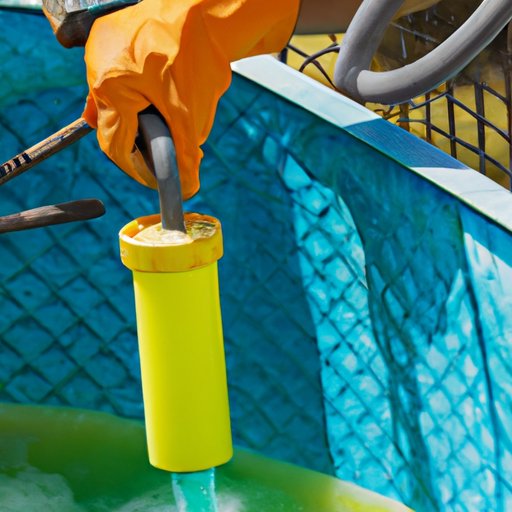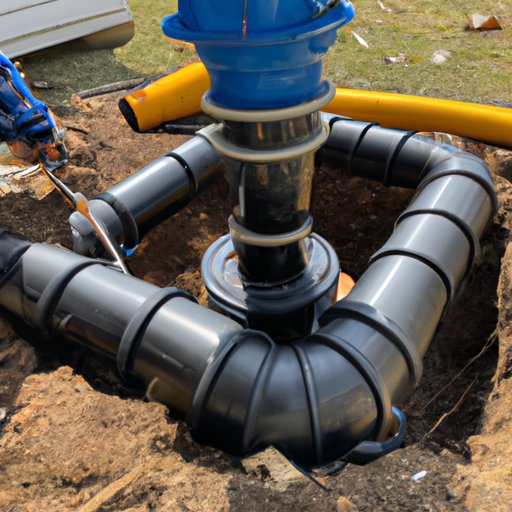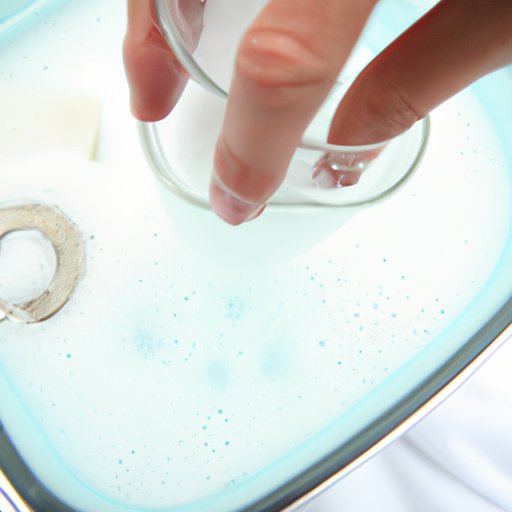Introduction
Sulfur odors in well water are caused by hydrogen sulfide gas, which is produced naturally by certain bacteria found in the environment. Hydrogen sulfide gas has a strong odor that can be described as rotten eggs or sewage. While it is not considered hazardous to health, the unpleasant smell makes it difficult to use the water for drinking, cooking, and other household tasks. Fortunately, there are several ways to reduce or eliminate sulfur odors from well water.
Installing a Water Filter with Sulfur-Reducing Capabilities
Installing a water filter with sulfur-reducing capabilities is one of the most effective ways to remove sulfur odors from well water. Water filters are designed to trap particles, such as sediment and bacteria, and reduce the amount of chlorine and other chemicals in the water. Some filters also contain special media that can reduce the amount of hydrogen sulfide gas in the water.
The benefits of using a water filter include better tasting and smelling water, improved water clarity, and improved overall water quality. There are several types of water filters to consider, including whole-house filtration systems, point-of-use filters, and reverse osmosis systems. Each type of filter has its own advantages and disadvantages, so it’s important to research the different options to find the best fit for your needs.
The installation process for a water filter depends on the type of filter you choose. Whole-house filtration systems require professional installation, while point-of-use filters can usually be installed by a homeowner. Reverse osmosis systems require more complex installation, but they are often the most effective option for reducing sulfur odors.
Using an Air-Stripping System to Remove Sulfur from the Water
An air-stripping system is another option for reducing sulfur odors in well water. Air-stripping systems work by passing water through a tower filled with plastic packing material, which causes oxygen to mix with the water. This creates an environment where sulfur compounds can be broken down and removed from the water.
The benefits of air-stripping systems include improved water taste and odor, reduced levels of sulfur compounds, and improved overall water quality. There are several types of air-stripping systems available, including continuous-flow and batch-type systems. Each type has its own set of advantages and disadvantages, so it’s important to research the different options before making a decision.
The installation process for an air-stripping system is relatively simple and can usually be completed by a homeowner. The system should be installed near the well pump, and all necessary piping should be connected to ensure proper operation.

Shock Chlorinating the Well with Chlorine Bleach
Shock chlorination is another method for reducing sulfur odors in well water. Shock chlorination involves adding a large amount of chlorine bleach to the well water to kill any bacteria that may be causing the sulfur odor. The chlorine bleach must be added in the correct concentration to be effective, so it’s important to follow the manufacturer’s instructions.
The benefits of shock chlorination include improved water taste and odor, reduced levels of bacteria, and improved overall water quality. The amount of chlorine bleach required will vary depending on the size of the well, so it’s important to consult with a professional before beginning the process. In addition, safety precautions must be taken when handling chlorine bleach, so it’s important to use protective gear and take all necessary safety measures.
Adding Lime to the Water to Reduce Sulfur Odors
Adding lime to the water is another option for reducing sulfur odors in well water. Lime works by binding to sulfur compounds and preventing them from being released into the air. The amount of lime needed will depend on the level of sulfur in the water, so it’s important to test the water before adding the lime.
The benefits of lime treatment include improved water taste and odor, reduced levels of sulfur compounds, and improved overall water quality. The amount of lime needed will vary depending on the level of sulfur in the water, so it’s important to consult with a professional before beginning the process. In addition, safety precautions must be taken when handling lime, so it’s important to use protective gear and take all necessary safety measures.

Installing an Aeration System to Help Reduce Sulfur Odors
Installing an aeration system is another way to reduce sulfur odors in well water. Aeration systems work by introducing oxygen into the water, which helps to break down sulfur compounds and reduce their odor. There are several types of aeration systems available, including surface aerators, subsurface aerators, and diffused aeration systems. Each type has its own advantages and disadvantages, so it’s important to research the different options to find the best fit for your needs.
The benefits of aeration systems include improved water taste and odor, reduced levels of sulfur compounds, and improved overall water quality. The installation process for an aeration system can be complex and may require professional assistance.

Treating the Water with a Hydrogen Peroxide Solution
Treating the water with a hydrogen peroxide solution is another option for reducing sulfur odors in well water. Hydrogen peroxide works by breaking down sulfur compounds and reducing their odor. The amount of hydrogen peroxide needed will depend on the level of sulfur in the water, so it’s important to test the water before adding the hydrogen peroxide.
The benefits of hydrogen peroxide treatment include improved water taste and odor, reduced levels of sulfur compounds, and improved overall water quality. The process for adding hydrogen peroxide is relatively simple and can usually be completed by a homeowner. Safety precautions must be taken when handling hydrogen peroxide, so it’s important to use protective gear and take all necessary safety measures.
Conclusion
Sulfur odors in well water can be unpleasant and difficult to deal with, but there are several ways to reduce or eliminate them. Installing a water filter with sulfur-reducing capabilities, using an air-stripping system, shock chlorinating the well with chlorine bleach, adding lime to the water, installing an aeration system, and treating the water with a hydrogen peroxide solution are all effective methods for reducing sulfur odors in well water. It’s important to research the different options and consult with a professional before beginning any of these processes.
(Note: Is this article not meeting your expectations? Do you have knowledge or insights to share? Unlock new opportunities and expand your reach by joining our authors team. Click Registration to join us and share your expertise with our readers.)
